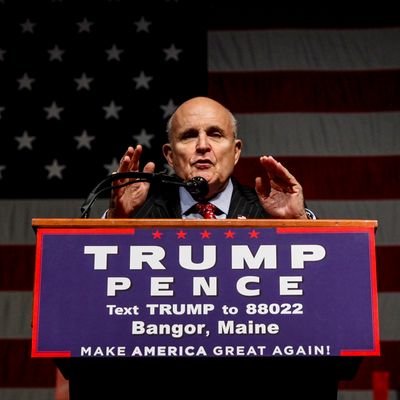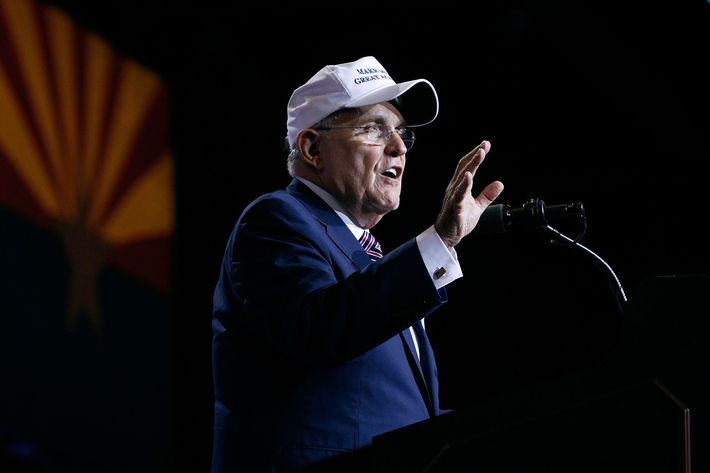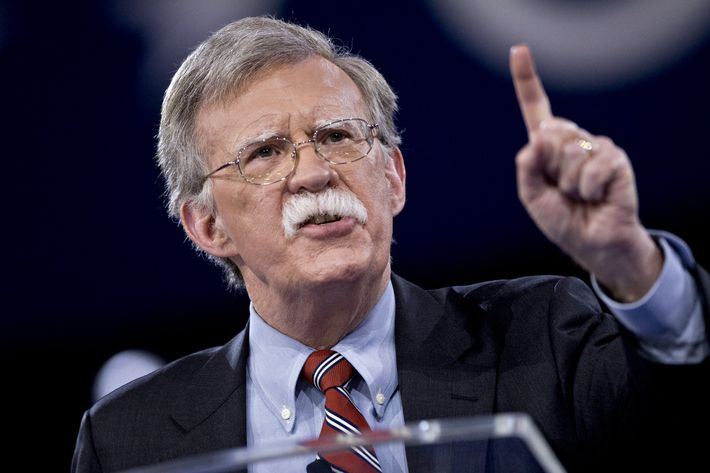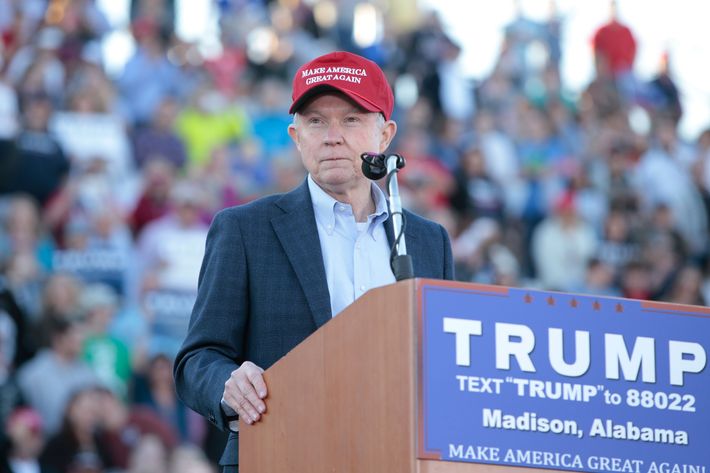
Running as a Washington outsider who disagrees frequently with members of his own party may have been the key to winning the White House in 2016, but it’s not very helpful when you need to create a functional government. Donald Trump kicked things off on Monday by naming GOP Establishment figure Reince Priebus as his chief of staff, and alt-right champion Steve Bannon as his chief strategist. As the debate rages on whether Bannon himself is a racist, an anti-Semite, and a white nationalist — or merely a popular figure among racists, anti-Semites, and white nationalists — Trump is looking ahead to his next divisive appointment.
On Monday, rumors swirled about whom Trump would name to several top national security positions, and each has the potential to rile up people from across the political spectrum — if they don’t kill each other first. A source described the disagreements within the Trump transition team as a “knife fight,” according to CNN.
While liberals have been bracing themselves for the possibility that Rudy Giuliani could be named attorney general, now reports claim he’s the front-runner for secretary of State. Trump is also said to be considering former U.N. ambassador John Bolton for State, and Senator Jeff Sessions for the top spots at the Justice Department, the Defense Department, or the Department of Homeland Security.
Trump and his vice-president, Mike Pence, are set to go over cabinet picks on Tuesday, so we could have an announcement on these positions soon. Here’s a look at the controversies they’re choosing between.

Rudy Giuliani
Rumored Position: Giuliani is the favorite to serve as secretary of State, according to the Associated Press. However, The Wall Street Journal, the New York Times, and CNN say he’s merely one of the finalists, along with John Bolton. He’s also been rumored for attorney general or Homeland Security secretary, but he’s made it clear he’s not very interested in those positions.
The Case for Giuliani: The former New York mayor appeared to be campaigning for secretary of State while speaking at a Wall Street Journal CEO Council event on Monday night. He said Bolton would be a good choice for the position, but when asked if there’s a better pick, Giuliani said, “Maybe me, I don’t know.”
Giuliani laid out how his foreign-policy views overlap with the president-elect’s, according to the Journal. He said Trump’s primary policy goal would be taking out ISIS, but didn’t explain how this would be accomplished. That actually lines up with Trump’s stance on the matter; he’s said he can’t reveal his plan to attack the terror group because he wants to remain “unpredictable.”
As for Russia and China, Giuliani said the Trump administration wants to reset relations with both countries. He said President Obama mishandled Russia by turning them into an adversary and failing to earn their respect. Giuliani suggested the solution is more threats. “Russia thinks it’s a military competitor, it really isn’t,” he said. “It’s our unwillingness under Obama to even threaten the use of our military that makes Russia so powerful.”
Why He’s Controversial: Giuliani has no foreign-policy experience, and recent comments he made on the topic were alarming. In September, he defended Trump’s claim that the U.S. should have seized Iraq’s oil, saying, “If we would have taken the oil, you wouldn’t have ISIS, because ISIS formed with the power and the wealth of that oil.” When asked if that’s legal, Giuliani said, “Of course it’s legal. It’s a war … Until the war is over, anything’s legal.” Seizing another country’s property is prohibited under the Geneva Conventions.
As a former federal prosecutor, Giuliani is seen as a better fit for attorney general, though the left has a long list of reasons why he shouldn’t be anywhere near the Justice Department. Radley Balko recapped many of them in the Washington Post this week, noting that Giuliani was “a stalwart defender of abusive cops,” the mayoral architect of “stop and frisk” (which he still touts as a success), and “an incredibly vindictive mayor.”
As mayor, Giuliani went after art, advertisements, and protests he found offensive, prompting First Amendment attorney Floyd Abrams to dub him “the single most consistent opponent of First Amendment rights in living memory.” In the past week, he’s suggested that the thousands of people protesting Trump’s election are “professional protesters,” and called them “a bunch of spoiled crybabies.”

John Bolton
Rumored Position: Several outlets say Bolton is a top contender for secretary of State. Compared to Giuliani, Bolton is a more conventional choice — for Trump, that is — but the former mayor has a much closer relationship with the president-elect.
The Case for Bolton: National Review published a piece on Saturday arguing for Bolton as secretary of State. They said the former ambassador to the United Nations under George W. Bush has extensive experience, “but has never become an establishmentarian or lost his edge.” The piece continued:
Bolton has the advantage of being an experienced, straight-talking yet nuanced foreign-policy hand, who also fits the Trump sensibility on national security. Bolton is an American internationalist who believes in the importance of American power. He is a hard-headed realist whose focus is always the national interest. He negotiated the creation of the Proliferation Security Initiative, for instance, a global effort to counter illicit trafficking in weapons and materials of mass destruction. It was, and is, a diplomatic rarity—“an activity, not an organization,” as one U.K. diplomat put it. United Nations, take note.
Bolton is a leading critic of international institutions, such as the U.N., and led the effort to keep the U.S. out of the International Criminal Court, which fits with Trump’s “America first” views.
Why He’s Controversial: In many other ways, Bolton and Trump hold opposite views on foreign policy, and it seems unlikely that the president-elect will be swayed by National Review, which published an entire “Against Trump” issue.
Bolton is one of the most hawkish neoconservatives, while Trump has suggested he wants to avoid foreign interventions. Trump claims he opposed the invasion of Iraq in 2003 (though that’s not what he said in public), but Bolton pushed for intervention, saying at the time that Saddam Hussein had “hidden weapons of mass destruction” and arguing that “the American role actually will be fairly minimal.” In 2015, Bolton said, “I still think the decision to overthrow Saddam was correct.”
While Trump has said he wants to work with Russia, in 2014 Bolton said the Obama administration should stand up to Putin, and “supply Kiev with weapons and other assistance, while also reviving President George W. Bush’s 2008 plan to fast track Ukraine for NATO membership.”
And while Trump and Bolton are both against the Iran nuclear deal, in 2015 Bolton argued in favor of bombing Iran.
A far lesser concern: There could be another political battle over Bolton’s confirmation. He’s known for his combative stances, and he’s been accused of bullying subordinates who disagreed with him. President George W. Bush was forced to use a recess appointment to make him ambassador to the United Nations after Democrats and even some Republicans blocked a vote on his nomination. A Trump source told CNN that while they believe it would be difficult, they think they could get Bolton confirmed this time around.

Jeff Sessions
Rumored Position: Politico says Senator Jeff Sessions is the top pick for secretary of Defense, but he could also be attorney general or Homeland Security secretary. The Times says he’s up for attorney general, and notes that neither he nor Giuliani has expressed interest in the less glamorous job of Homeland Security secretary.
The Case for Sessions: The Alabama senator endorsed Trump in February and has been his top ally in Congress. He’s the rare Trump loyalist who has extensive government experience. He served in the U.S. Army Reserve from 1973 to 1986, was first elected to the Senate in 1997, and sits on the Senate Armed Services Committee, where he chairs the subcommittee on nuclear-weapons policy. He’s led Trump’s national-security committee since March.
Sessions served as Alabama attorney general in the mid-’90s and is known for taking hardline positions on immigration, which could make him a good pick for the top post at the Justice Department.
On defense, the senator has expressed support for Trump’s military expansion plan, which could add more than $55 billion annually to the Pentagon’s budget, though he’s a budget hawk. He told Defense News last month:
[Trump’s plan would create] a need for a spending increase, there is just no doubt about it. And it is painful for me as a budget person to acknowledge that we can’t stay at a sequester-like level. We are just not going to be able to do that. But President Trump will not do the one thing that President Obama and Hillary Clinton favor. That if you increase defense spending, you have to increase the non-defense spending at the same amount. That is just absurd.
Why He’s Controversial: In 1986, Sessions was rejected for a federal judgeship after several U.S. attorneys testified that he had made racist remarks, including calling a black prosecutor “boy,” referring to a white civil-rights lawyer as a “disgrace to his race,” and calling the NAACP “Communist-inspired” and “un-American.” Sessions denied the allegations, but failed to convince a bipartisan group of ten senators on the Judiciary Committee.
One GOP official told Politico that Sessions “is opposed to the president elect’s own plan for defense,” adding, “He’s a Judiciary guy, that’s where his heart is. That’s his baby, not defense. If he goes to Defense, it’s a disaster.”






























